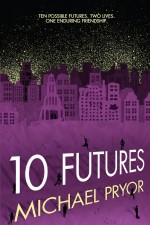A New Book: 10 Futures
I can finally divulge details of the top secret project I’ve been working on for some time. 10 Futures is a series of linked stories which explore humanity’s next hundred years. Ten story segments, ten possible futures, each with its own challenges and opportunities – overpopulation, worldwide financial collapse, medical miracles, the rise of artificial intelligence, virulent pandemics, global warming/climate change, greatly increased lifespans, religious fundamentalism and war.
What unites these stories is the presence of Tara and Sam, best friends forever, coping with the futures that we are setting up today. Every one of the story segments is based on a current trend or development – technological and sociological – with the assistance of a simple question: what happens if this continues?
I spent a great deal of time researching these trends, and every item I uncovered was balanced by my need to work with the human aspect of these changes. the How do you grow up in 2050? In 2080? In a world where water is rationed? In a world where freedom is unknown? In a world where your partner is chosen for you by your genetic suitability? Much will stay the same – people will still be people in 2100 – but some new ethical and moral dilemmas will be spawned. What are the rights of clones? What is the punishment for water theft in a world where everyone is thirsty?
I’m immensely proud of 10 Futures. Imagining the future is important. If we don’t think about it and talk about it in an informed and thoughtful way, we’re stumbling ahead blindfolded. Is that any way to proceed?
10 Futures comes with an extensive set of Teachers’ Notes aligned to the Australian Curriculum and will be available in April. For more, including ordering details, see the Random House Australia site.

It sounds fascinating, a brilliant idea. While something that deals with discussing our future etc. might not immediately appeal to me, the idea of throwing two characters into different worlds is exciting.
Also, a book of short stories sounds like an ideal thing to read during study! 🙂
That’s the important thing, Kathryn, the human dimension – otherwise I’d just have a book about issues. Placing it in a narrative context, strangely, makes it all more real.